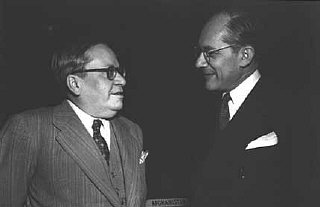Source: USHMM.org

United Nations Archives and Records Management Section
“[T]he allies decided in Nuremberg a case against a past Hitler, but refused to envisage future Hitlers, or like situations … In brief, the Germans were punished only for crimes committed during or in connection with the war of aggression. Crimes against humanity were not an independent category of crimes in themselves. They were only considered crimes when their connection with other crimes could be established.”
Unpublished memoir of Raphael Lemkin
In 1945, there was no specific legal definition for the systematic destruction of a particular group of people. It was not until 1944 that there was even a word for such an act and in 1948 that this act was formally criminalized in international law.
In 1944, a Polish Jewish lawyer named Raphael Lemkin (1900-1959) sought to describe Nazi policies of systematic murder, including the destruction of European Jewry. He formed the wordgenocide by combining geno-, from the Greek word for race or tribe, with -cide, from the Latin word for killing. In proposing this new term, Lemkin had in mind “a coordinated plan of different actions aiming at the destruction of essential foundations of the life of national groups, with the aim of annihilating the groups themselves.” The next year, the International Military Tribunal (IMT) at Nuremberg charged top Nazis with “crimes against humanity.” The word genocide was included in the indictment, but was used as a descriptive, not legal, term.
On December 9, 1948, in the shadow of the Holocaust and in no small part due to the tireless efforts of Lemkin himself, the United Nations approved a Convention on the Prevention and Punishment of the Crime of Genocide. This convention established "genocide” as an international crime, which signatory nations “undertake to prevent and punish.” In the words of the landmark Genocide Convention:
[G]enocide means any of the following acts committed with intent to destroy, in whole or in part, a national, ethnical, racial or religious group, as such:
a. Killing members of the group;
b. Causing serious bodily or mental harm to members of the group;
c. Deliberately inflicting on the group conditions of life calculated to bring about its physical destruction in whole or in part;
d. Imposing measures intended to prevent births within the group;
e. Forcibly transferring children of the group to another group.
No comments:
Post a Comment